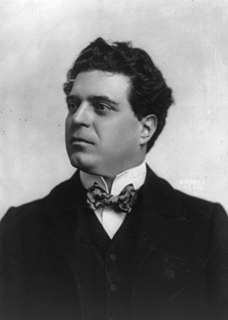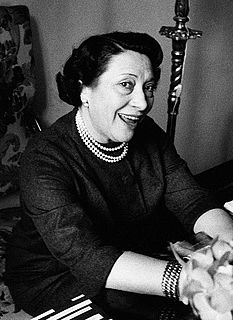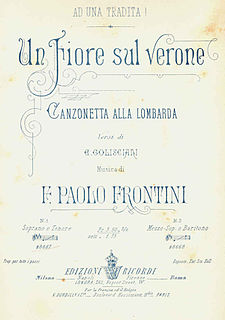Related Research Articles

Pietro Mascagni was an Italian composer primarily known for his operas. His 1890 masterpiece Cavalleria rusticana caused one of the greatest sensations in opera history and single-handedly ushered in the Verismo movement in Italian dramatic music. While it was often held that Mascagni, like Ruggiero Leoncavallo, was a "one-opera man" who could never repeat his first success, L'amico Fritz and Iris have remained in the repertoire in Europe since their premieres.

Amilcare Ponchielli was an Italian opera composer, best known for his opera La Gioconda. He was married to the soprano Teresina Brambilla.

Umberto Menotti Maria Giordano was an Italian composer, mainly of operas.

Félix Lope de Vega y Carpio was a Spanish playwright, poet, and novelist. He was one of the key figures in the Spanish Golden Age of Baroque literature. His reputation in the world of Spanish literature is second only to that of Miguel de Cervantes, while the sheer volume of his literary output is unequalled, making him one of the most prolific authors in the history of literature. He was nicknamed "The Phoenix of Wits" and "Monster of Nature" by Cervantes because of his prolific nature.

Il campiello is an opera in three acts by Ermanno Wolf-Ferrari. The libretto was by Mario Ghisalberti, after the famous comedy of the same name written for the 1756 Venetian Carnival by the great Venetian playwright, Carlo Goldoni.

Sly, ovvero La leggenda del dormiente risvegliato is an opera in three acts by Ermanno Wolf-Ferrari to an Italian libretto by Giovacchino Forzano, based on the Induction to William Shakespeare's The Taming of the Shrew. Unlike most of Wolf-Ferrari's other operas, this is a tragedy.

Mafalda Favero was an Italian operatic soprano.
Carlo Evasio Soliva was a Swiss-Italian composer of opera, chamber music, and sacred choral works. Soliva was born in Casale Monferrato, Piedmont to a family of Swiss chocolatiers who had emigrated from the canton of Ticino. He studied pianoforte and composition at the Milan Conservatory.

Enrico Golisciani was an Italian author, born in Naples. He is best known for his opera librettos, but also published a slim volume of verses for music, entitled Pagine d'Album ; many more of his poems intended to be set to music were published in the Gazzetta Musicale di Milano.

Siberia is an opera in three acts by Umberto Giordano from a libretto by Luigi Illica. It premiered on 19 December 1903 at La Scala in Milan. There is no direct source for the plot of Siberia and it is quite possible that this is an original work by Illica. It was suggested at the New York premiere in 1908 that it was based on Leo Tolstoy's 1899 novel Resurrection or one of the novels within it.

Giovacchino Forzano was an Italian playwright, librettist, stage and film director. A resourceful writer, he authored numerous popular plays and produced opera librettos for most of the major Italian composers of the early twentieth century, including the librettos for Giacomo Puccini's Suor Angelica and Gianni Schicchi.

La vedova scaltra is an opera in three acts by Ermanno Wolf-Ferrari to a text by Mario Ghisalberti, after Carlo Goldoni's original play first given in 1748.
Ferdinando Orlandi, also referred to as Orland and Orlando. Little is known of his early life and his year of birth is also cited as 1777. He was an Italian musician and teacher of singing who composed cantatas and sacred music, but was particularly known for his operas, not all of which have survived. He was born and died in Parma.

The art collections of Fondazione Cariplo are a gallery of artworks with a significant historical and artistic value owned by Fondazione Cariplo in Italy. It consists of 767 paintings, 116 sculptures, 51 objects and furnishings dating from the 1st century to the second half of the 20th century.

Luca Francesconi is an Italian composer. He studied at the Milan Conservatory, then with Karlheinz Stockhausen and Luciano Berio.
Daniele Rustioni is an Italian conductor.
La dama boba is a 1613 comedy by the Spanish playwright Lope de Vega. It is one of the earliest examples of the "comedia palatina" subgenre. De Vega completed it on 28 April 1613, as shown by a surviving manuscript copy in his own hand.
Bruno Landi was an Italian operatic tenor.
Gli dei a Tebe is an opera in three acts by Ermanno Wolf-Ferrari on a libretto by Mario Ghisalberti, performed for the first time at the Opernhaus in Hannover on 4 June 1943. The first performance used the translation of the libretto in German by Franz Rau. Ghisalberti had in turn derived the libretto from a work by the publisher Ludwig Strecker, who wrote librettos under the pseudonym Ludwig Andersen.

Giuseppe Palanti was an Italian painter, illustrator, and urban planner, best known for his portraits, notably of Mussolini and Pius XI. He had a long collaboration with Teatro alla Scala in Milan, creating costume, set design and advertising material for multiple opera productions. He was also a major contributor towards the development of the seaside resort Milano Marittima.
References
- ↑ David Mason Greene Greene's Biographical Encyclopedia of Composers -0385142781 1985- Page 1044 "Perhaps sensing that his operatic sun had set, Wolf-Ferrari took up writing orchestral and chamber music again, including a violin concerto, a cello concerto and a short symphony. His final operas were La Dama boba (The Silly Lady, after Lope de Vega), produced at La Scala in 1939, and Gli Dei a Tebe (The Gods at Thebes), at Hannover in 1943. During World War II he taught at the Salzburg Mozarteum. Afterward he returned to Zürich but came back to Venice to die."
- ↑ The New International Year Book 1939 - published 1940 Page 513 A new work by Wolf-Ferrari, La Dama Boba, with a libretto by Mario Ghisalberti based upon a Lope de Vega comedy, was produced in the Teatro della Scala in Milan February 1, under Umberto Berretoni, with ...